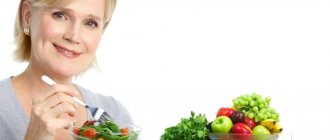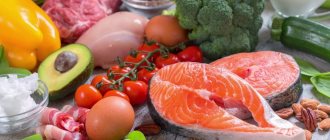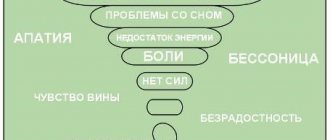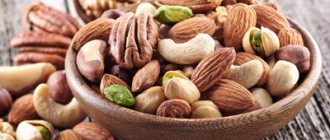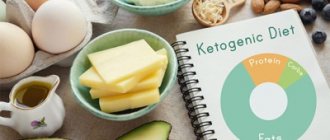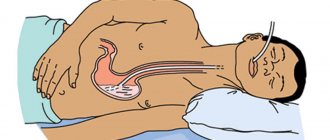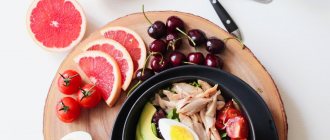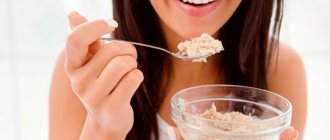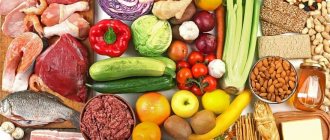Not feeling the joy of life or being in a state of anxiety, we often grab food - but, as it turns out, it’s not at all what we need! We'll tell you how you can use nutrition to correct symptoms of depression and headaches.
Let's start with some scary numbers. Today, depression is the world leader in the number of mental disorders. According to WHO estimates, more than 300 million people from all age groups suffer from it, including 8 million Russians. And every year this disease leads to 800 thousand suicides in the world - for people 15-29 years old it is the second leading cause of death.
Women are more susceptible to depression than men, due to greater susceptibility due to hormonal, genetic or other characteristics of brain development and functioning.
With age, the likelihood of depressive disorders only increases. If in developed countries every second such patient receives help, then in the rest of the world - at best, every tenth. And not only does the patient suffer from depression, his family suffers, which cannot live fully, society suffers, in whose life the person no longer takes an active part, and the economy bears the costs.
For every third patient with depression, traditional drug therapy does not help. In general, the world community is sounding the alarm, and I completely agree that depression is one of the threats to human health, along with obesity.
How stress leads to depression
According to experts, in general, depression is observed in 20-30 percent of people who seek medical help for a completely different reason. Rarely does a person come straight to a psychotherapist; rather, he will turn, for example, to a gastroenterologist or cardiologist. Our body is a single system, and there is no denying the fact that there is a clear relationship between depression and physical health.
For example, cardiovascular diseases and gastrointestinal pathologies can lead to the development of depression, and vice versa. And, of course, one of the significant factors in the formation of this condition is stress.
As soon as a stressful event occurs (or simply daily stress accumulates to a certain level), our sympathetic nervous system (this is part of the autonomic nervous system) and the hypothalamic-pituitary-adrenal system (hypothalamic-pituitary-adrenal axis, HPA) are immediately activated. on which the production of most important hormones depends. Within a few hours after this, cortisol and adrenaline are released, which have a significant effect on the physiological activity of the gastrointestinal tract, reduce the motility of the stomach and small intestine, as well as the synthesis of hydrochloric acid in the stomach, and at the same time increase the motility of the large intestine.
These processes certainly affect the composition of the intestinal microbiome, leading to its dysbiosis - microbial imbalance. The brain learns about unpleasant events occurring in the intestines through hormonal and neural signals and reacts to this, in turn, with a whole range of disorders: anxiety and aggressiveness increase, memory and concentration deteriorate, signs of depression appear, etc.
Authorized Products
Diet for depression includes:
- Fish and seafood (haddock, sardines, salmon, tuna, cod, herring).
- Vegetables (onions and garlic, carrots, baked potatoes, cabbage, celery, zucchini, eggplant, tomatoes, cucumbers, beets) in any form, legumes, garden herbs (green onions, arugula, basil, parsley, dill, cilantro).
- Whole grain products (brown rice, cereals, wholemeal bread/crisps).
- Low fat fermented milk products, cheese.
- Beef, veal, rabbit, turkey, chicken, offal.
- Chicken eggs, cold-pressed vegetable oils, nuts, seeds, seaweed.
- Fermented foods: kombucha, fermented vegetables, fermented soybean products, natural yogurt, apple cider vinegar.
- Purified water, freshly prepared juices, herbal teas, rosehip infusion, decoctions of St. John's wort, hop cones, mint, valerian.
Table of permitted products
| Proteins, g | Fats, g | Carbohydrates, g | Calories, kcal | |
Vegetables and greens | ||||
| greenery | 2,6 | 0,4 | 5,2 | 36 |
| eggplant | 1,2 | 0,1 | 4,5 | 24 |
| beans | 6,0 | 0,1 | 8,5 | 57 |
| zucchini | 0,6 | 0,3 | 4,6 | 24 |
| cabbage | 1,8 | 0,1 | 4,7 | 27 |
| broccoli | 3,0 | 0,4 | 5,2 | 28 |
| boiled cauliflower | 1,8 | 0,3 | 4,0 | 29 |
| bulb onions | 1,4 | 0,0 | 10,4 | 41 |
| carrot | 1,3 | 0,1 | 6,9 | 32 |
| cucumbers | 0,8 | 0,1 | 2,8 | 15 |
| salad pepper | 1,3 | 0,0 | 5,3 | 27 |
| salad | 1,2 | 0,3 | 1,3 | 12 |
| beet | 1,5 | 0,1 | 8,8 | 40 |
| celery | 0,9 | 0,1 | 2,1 | 12 |
| soybeans | 34,9 | 17,3 | 17,3 | 381 |
| asparagus | 1,9 | 0,1 | 3,1 | 20 |
| tomatoes | 0,6 | 0,2 | 4,2 | 20 |
| Jerusalem artichoke | 2,1 | 0,1 | 12,8 | 61 |
| pumpkin | 1,3 | 0,3 | 7,7 | 28 |
| beans | 7,8 | 0,5 | 21,5 | 123 |
| garlic | 6,5 | 0,5 | 29,9 | 143 |
| lentils | 24,0 | 1,5 | 42,7 | 284 |
Fruits | ||||
| avocado | 2,0 | 20,0 | 7,4 | 208 |
| oranges | 0,9 | 0,2 | 8,1 | 36 |
| bananas | 1,5 | 0,2 | 21,8 | 95 |
| pomegranate | 0,9 | 0,0 | 13,9 | 52 |
| grapefruit | 0,7 | 0,2 | 6,5 | 29 |
| pears | 0,4 | 0,3 | 10,9 | 42 |
| kiwi | 1,0 | 0,6 | 10,3 | 48 |
| lemons | 0,9 | 0,1 | 3,0 | 16 |
| mango | 0,5 | 0,3 | 11,5 | 67 |
| tangerines | 0,8 | 0,2 | 7,5 | 33 |
| nectarine | 0,9 | 0,2 | 11,8 | 48 |
| peaches | 0,9 | 0,1 | 11,3 | 46 |
| apples | 0,4 | 0,4 | 9,8 | 47 |
Berries | ||||
| gooseberry | 0,7 | 0,2 | 12,0 | 43 |
| Red currants | 0,6 | 0,2 | 7,7 | 43 |
| black currant | 1,0 | 0,4 | 7,3 | 44 |
Nuts and dried fruits | ||||
| nuts | 15,0 | 40,0 | 20,0 | 500 |
| cashew | 25,7 | 54,1 | 13,2 | 643 |
| sesame | 19,4 | 48,7 | 12,2 | 565 |
| flax seeds | 18,3 | 42,2 | 28,9 | 534 |
| fenugreek seeds | 23,0 | 6,4 | 58,3 | 323 |
| sunflower seeds | 20,7 | 52,9 | 3,4 | 578 |
Cereals and porridges | ||||
| buckwheat (kernel) | 12,6 | 3,3 | 62,1 | 313 |
| oat groats | 12,3 | 6,1 | 59,5 | 342 |
| cereals | 11,9 | 7,2 | 69,3 | 366 |
| millet cereal | 11,5 | 3,3 | 69,3 | 348 |
| barley grits | 10,4 | 1,3 | 66,3 | 324 |
Chocolate | ||||
| chocolate | 5,4 | 35,3 | 56,5 | 544 |
Raw materials and seasonings | ||||
| honey | 0,8 | 0,0 | 81,5 | 329 |
Dairy | ||||
| skim milk | 2,0 | 0,1 | 4,8 | 31 |
| natural yogurt 2% | 4,3 | 2,0 | 6,2 | 60 |
Cheeses and cottage cheese | ||||
| cheese | 24,1 | 29,5 | 0,3 | 363 |
| cottage cheese 0.6% (low fat) | 18,0 | 0,6 | 1,8 | 88 |
| curd tofu | 8,1 | 4,2 | 0,6 | 73 |
Meat products | ||||
| beef | 18,9 | 19,4 | 0,0 | 187 |
| rabbit | 21,0 | 8,0 | 0,0 | 156 |
Sausages | ||||
| boiled diet sausage | 12,1 | 13,5 | 0,0 | 170 |
Bird | ||||
| chicken fillet | 23,1 | 1,2 | 0,0 | 110 |
| turkey | 19,2 | 0,7 | 0,0 | 84 |
Fish and seafood | ||||
| fish | 18,5 | 4,9 | 0,0 | 136 |
| squid | 21,2 | 2,8 | 2,0 | 122 |
| mussels | 9,1 | 1,5 | 0,0 | 50 |
| seaweed | 0,8 | 5,1 | 0,0 | 49 |
Oils and fats | ||||
| butter | 0,5 | 82,5 | 0,8 | 748 |
| linseed oil | 0,0 | 99,8 | 0,0 | 898 |
| olive oil | 0,0 | 99,8 | 0,0 | 898 |
| sunflower oil | 0,0 | 99,9 | 0,0 | 899 |
Non-alcoholic drinks | ||||
| mineral water | 0,0 | 0,0 | 0,0 | — |
| green tea | 0,0 | 0,0 | 0,0 | — |
| * data is per 100 g of product | ||||
Probiotics against depression
The “emotional” connection between the intestinal microbiome and the brain is very clear and has been proven by scientists.
They are like twins: if one feels bad, the other certainly feels it and gets upset. For example, recently microbiologists from the USA presented the results of a study on the effect of stress on the microbiome of rats. The experiment, it must be said, was not the most humane: the experimental subjects were subjected to emotional and physiological stress, as a result of which groups were identified as “stress-resistant” and “not stress-resistant.”
In the microbiome of rats from the second group, a high content of certain bacteria was found, in particular, the genus Clostridia. And, having transplanted it to a stress-resistant animal, they found that the latter’s behavior changed to depressive, and in the hippocampus, a part of the brain that plays an important role in the formation of spatial orientation, perception and storage of information, the onset of an inflammatory process was discovered.
And, on the contrary, beneficial bacteria (probiotics) have a positive effect on both the behavior of experimental subjects and the biochemical parameters of the body. Ted Dinan, professor of psychiatry and scientific director of the Center for Nutritional Pharmabiotics at University College in Ireland, also discovered this in an experiment on rats.
First, he separated newborn rat pups from their mother, which caused them to develop depression and a significant decrease in immunity, and then gave them the probiotic Bifidobacterium infantis, after which the experimental subjects’ lives clearly improved and their mood improved.
Thanks to this experiment, a new term “psychobiotic” appeared in science, which refers to bacteria that, when ingested in sufficient concentration, can benefit mental health.
Here is another recent study, this time conducted by Dutch and Belgian scientists: they were able to compare the composition of the intestinal microbiome and some indicators of human well-being. It has been confirmed that the “microbial background” differs among people depending not only on their emotional and physical well-being, but also on whether they take antidepressants, as well as on their overall quality of life. For example, large numbers of bacteria from the Faecalibacterium family have been found in the intestines of those who suffer from depression.
What does the gut-brain connection mean for treating depression?
Gastrointestinal hormones and neurotransmitters serotonin, dopamine and norepinephrine play a role in the formation of symptoms of depression.
By the way, dopamine and serotonin interact with each other in an interesting way: high dopamine levels reduce serotonin levels and vice versa. That is, when we really want something and strive for the goal with all our hearts (which is accompanied by a high level of dopamine), we are not inclined at that moment to go crazy with joy and vigorously express positive emotions.
And vice versa, when we simply enjoy life, even without special reasons (at the same time, the level of serotonin increases), our determination decreases - why strive for something when it’s already good?
As for norepinephrine, it is the neurons that synthesize this substance that regulate the functioning of other neurons - those that produce dopamine. This means that a sufficient amount of norepinephrine provides resistance to stress and reduces the likelihood of developing depression.
The activity of the gastrointestinal tract is affected by both the lack of serotonin, which is concentrated here at almost 95 percent, and dopamine - it plays a similar role as a signaling molecule, transmitting impulses between neurons of the gastrointestinal tract and coordinating contractions of the circular muscles, for example, in the large intestine. And its lack, again, affects both the psycho-emotional state and the peristalsis of the large intestine.
Look what happens in the end. On the one hand, changes in the amount of chemicals that transmit nerve impulses and gastrointestinal hormones can provoke various disorders in the functioning of the intestines. On the other hand, people suffering from intestinal problems often experience panic disorder, depression, stress, and suffer from migraines.
So it turns out that in many cases it is not enough to treat depression with just sessions with a psychotherapist or taking antidepressants, which, as it turns out, do not work on everyone (this is due to the functioning of the nerve cells of a particular patient). If the gut-brain connection is an axiom, then by influencing the gut and reducing inflammation through dietary modification and rational intake of pre- and probiotics, we can achieve excellent results.
Fully or partially limited products
The diet for depression excludes:
- Fatty meats, cooking fats, duck, goose, smoked meats.
- Products containing simple carbohydrates (sugar, packaged juices, jam, jam, ice cream, sweets, sweet drinks).
- Refined grain carbohydrates (cakes, pastries, pastries, premium flour products).
- Smoked products, canned food, fast food products, semi-finished products.
- High fat dairy/fermented milk products.
- Caffeine containing drinks, alcohol.
Table of prohibited products
| Proteins, g | Fats, g | Carbohydrates, g | Calories, kcal | |
Vegetables and greens | ||||
| radish | 1,2 | 0,1 | 3,4 | 19 |
| white radish | 1,4 | 0,0 | 4,1 | 21 |
| red radish | 1,2 | 0,1 | 3,4 | 20 |
| black radish | 1,9 | 0,2 | 6,7 | 35 |
| spinach | 2,9 | 0,3 | 2,0 | 22 |
| sorrel | 1,5 | 0,3 | 2,9 | 19 |
Berries | ||||
| grape | 0,6 | 0,2 | 16,8 | 65 |
Mushrooms | ||||
| mushrooms | 3,5 | 2,0 | 2,5 | 30 |
Nuts and dried fruits | ||||
| raisin | 2,9 | 0,6 | 66,0 | 264 |
Cereals and porridges | ||||
| semolina | 10,3 | 1,0 | 73,3 | 328 |
| white rice | 6,7 | 0,7 | 78,9 | 344 |
Flour and pasta | ||||
| pasta | 10,4 | 1,1 | 69,7 | 337 |
Confectionery | ||||
| jam | 0,3 | 0,2 | 63,0 | 263 |
| jam | 0,3 | 0,1 | 56,0 | 238 |
| candies | 4,3 | 19,8 | 67,5 | 453 |
| pastry cream | 0,2 | 26,0 | 16,5 | 300 |
| cookie | 7,5 | 11,8 | 74,9 | 417 |
Ice cream | ||||
| ice cream | 3,7 | 6,9 | 22,1 | 189 |
Cakes | ||||
| cake | 4,4 | 23,4 | 45,2 | 407 |
Raw materials and seasonings | ||||
| mustard | 5,7 | 6,4 | 22,0 | 162 |
| mayonnaise | 2,4 | 67,0 | 3,9 | 627 |
Dairy | ||||
| milk 3.6% | 2,8 | 3,6 | 4,7 | 62 |
| milk 4.5% | 3,1 | 4,5 | 4,7 | 72 |
| cream | 2,8 | 20,0 | 3,7 | 205 |
| sour cream 25% (classic) | 2,6 | 25,0 | 2,5 | 248 |
Cheeses and cottage cheese | ||||
| cottage cheese 11% | 16,0 | 11,0 | 1,0 | 170 |
| cottage cheese 18% (fat) | 14,0 | 18,0 | 2,8 | 232 |
Meat products | ||||
| pork | 16,0 | 21,6 | 0,0 | 259 |
| pork liver | 18,8 | 3,6 | 0,0 | 108 |
| pork kidneys | 13,0 | 3,1 | 0,0 | 80 |
| pork fat | 1,4 | 92,8 | 0,0 | 841 |
| salo | 2,4 | 89,0 | 0,0 | 797 |
| beef liver | 17,4 | 3,1 | 0,0 | 98 |
| beef kidneys | 12,5 | 1,8 | 0,0 | 66 |
| beef brains | 9,5 | 9,5 | 0,0 | 124 |
Sausages | ||||
| smoked sausage | 16,2 | 44,6 | 0,0 | 466 |
| smoked sausage | 9,9 | 63,2 | 0,3 | 608 |
| sausages | 10,1 | 31,6 | 1,9 | 332 |
| sausages | 12,3 | 25,3 | 0,0 | 277 |
Bird | ||||
| smoked chicken | 27,5 | 8,2 | 0,0 | 184 |
| duck | 16,5 | 61,2 | 0,0 | 346 |
| smoked duck | 19,0 | 28,4 | 0,0 | 337 |
| goose | 16,1 | 33,3 | 0,0 | 364 |
Fish and seafood | ||||
| smoked fish | 26,8 | 9,9 | 0,0 | 196 |
| salted fish | 19,2 | 2,0 | 0,0 | 190 |
| Red caviar | 32,0 | 15,0 | 0,0 | 263 |
| black caviar | 28,0 | 9,7 | 0,0 | 203 |
| canned fish | 17,5 | 2,0 | 0,0 | 88 |
| cod (liver in oil) | 4,2 | 65,7 | 1,2 | 613 |
Oils and fats | ||||
| animal fat | 0,0 | 99,7 | 0,0 | 897 |
| cooking fat | 0,0 | 99,7 | 0,0 | 897 |
Non-alcoholic drinks | ||||
| instant coffee dry | 15,0 | 3,5 | 0,0 | 94 |
| black tea | 20,0 | 5,1 | 6,9 | 152 |
| * data is per 100 g of product | ||||
Headache is an alarm signal from the intestines
And finally, about one more “pig” that your intestines, or more precisely, you can play on yourself, with your careless attitude towards the work of this organ. Surely you have at least once tried to go on strict, “starvation” diets, and if the willpower was enough for at least a day, I am sure that you most likely turned away from the path of slimness because of a headache.
Indeed, a headache from hunger is a “hello” from evolution, because thanks to this signal, our ancestors were forced to get out of the cave and go in search of food, no matter how much they wanted to sit by the fire, wrapped in a mammoth skin. When we are hungry, our blood glucose levels drop, our brain lacks energy, and it reports this in a way that is accessible to it.
But, in addition, a headache can be a reaction to the entry of unwanted substances into the intestines, from toxins to foods to which you are allergic, hypersensitive or intolerant. Data on the biochemical mechanisms of migraine attacks indicate that the metabolism of certain substances is disrupted, primarily serotonin, which is mainly concentrated in the intestines, as well as histamine, a sharp release of which leads to dilation of blood vessels - as a result, we get an attack.
If you often suffer from migraines, try to bring your diet in line with the “tastes” of your intestines. You will make him happy, and he will make you happy!
Orange and red vegetables and fruits
Pumpkin, oranges and tangerines, bell peppers, carrots and beets - all brightly colored vegetables can put you in a good mood. After all, they contain a lot of vitamins, for example, citrus fruits are rich in vitamin C, which the body needs to process amino acids contained in animal proteins into the joy hormone serotonin. Vegetables and fruits also contain bioflavonoids, which improve blood circulation in the brain. Consequently, more oxygen and nutrients enter the brain, increasing vigor and good mood.
7 most useful products of October>>>
